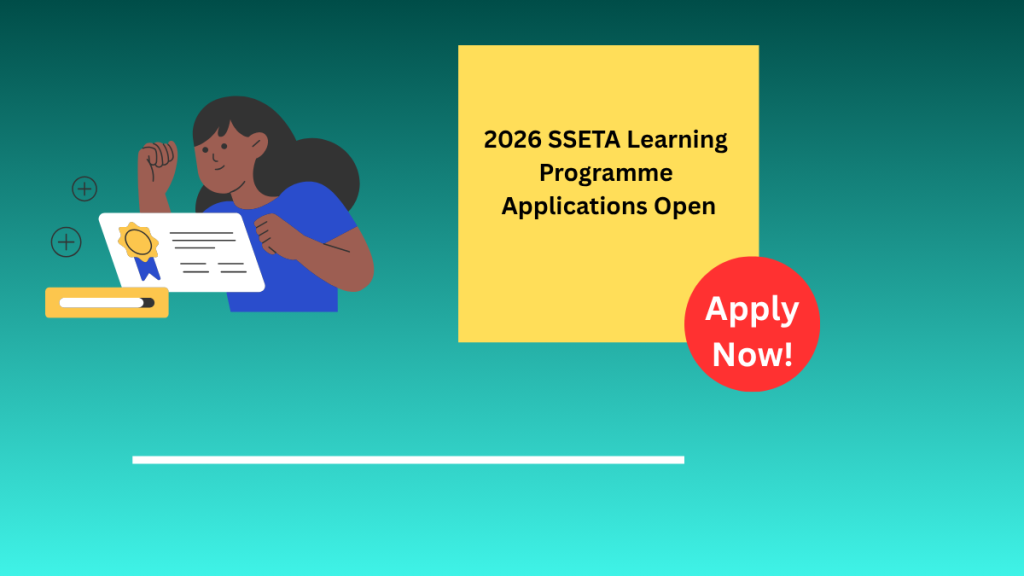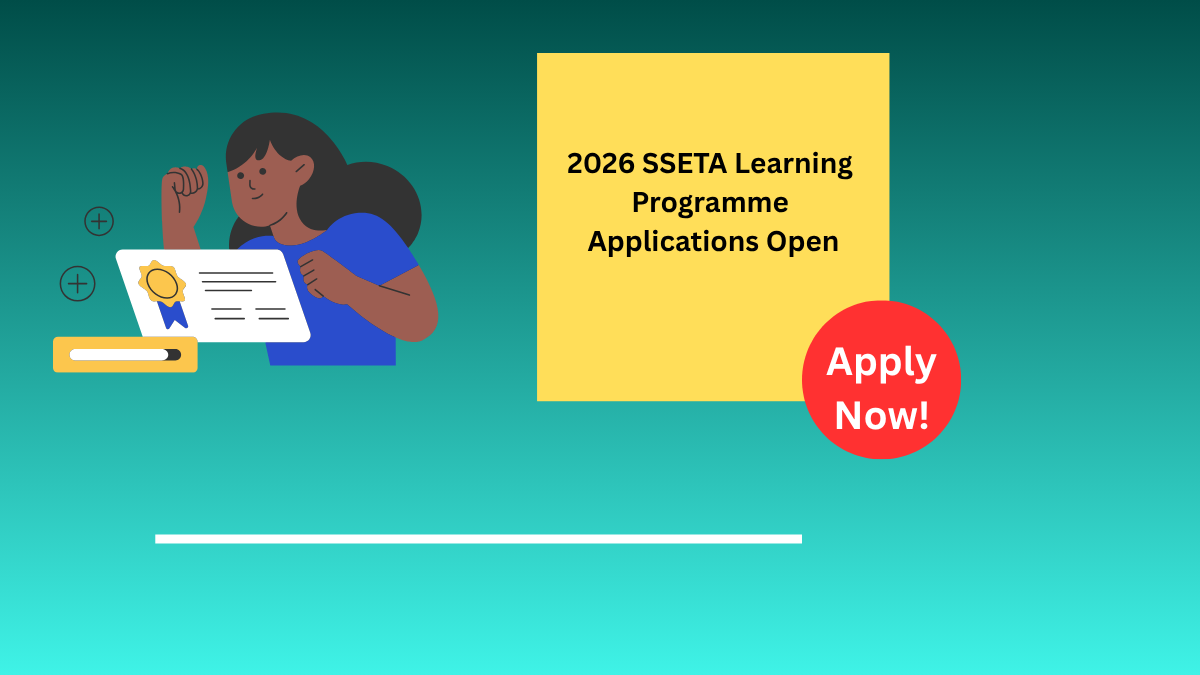Meta Description:
Applications are open for the 2026 Services SETA (SSETA) Learning Programme. Discover how unemployed South African youth aged 18–35 can gain valuable work experience, accredited qualifications, and job opportunities through this national skills development initiative.
Introduction: Your Pathway to Skills and Opportunity
South African youth, take note — the 2026 Services Sector Education and Training Authority (SSETA) Learning Programme has officially opened applications, and spots are limited.
This is more than a training opportunity; it’s a direct path to real-world skills, hands-on learning, and lasting employability.
If you’re between 18 and 35 years old, unemployed, and eager to gain experience in key growth sectors, this guide breaks down everything you need to know — from eligibility and documents to application steps and success strategies.
The SSETA Learning Programme is a flagship government initiative aimed at bridging South Africa’s skills gap. By connecting young people with partner employers, it prepares participants for sustainable jobs across industries such as finance, business administration, and digital technology.
What Is the 2026 SSETA Learning Programme?
The SSETA Learning Programme combines classroom instruction with workplace training, providing young South Africans with nationally accredited qualifications and practical experience.
Participants are enrolled in learnerships, internships, and apprenticeships that typically run between 6 months and 24 months.
Unlike traditional study routes that often lack work experience, this model allows learners to earn while they learn — developing practical skills that employers actively seek.
These programmes are structured to meet industry needs and are fully aligned with the National Qualifications Framework (NQF), ensuring every completed course has long-term career value.
Programme Objectives: Building a Skilled Generation
The 2026 SSETA Learning Programme is driven by four core goals:
- Addressing youth unemployment by creating pathways from learning to earning.
- Developing sector-relevant skills that match employer demand.
- Promoting transformation and inclusion, particularly for disadvantaged communities.
- Supporting South Africa’s economic recovery through skills-based employment.
For 2026, SSETA has sharpened its focus on digital literacy, financial administration, and technical trades, ensuring that graduates are equipped for the modern workplace.
Sectoral Focus and Key Training Areas
SSETA’s training initiatives span multiple service industries that power South Africa’s economy.
The 2026 intake focuses on the following sectors:
- Digital Skills: Data entry, coding, IT support, and e-commerce administration.
- Finance and Business Administration: Accounting support, payroll, and customer service.
- Manufacturing Support: Quality control, product assembly, and supply chain coordination.
- Retail and Sales: Point-of-sale systems, inventory management, and client engagement.
- Entrepreneurship: Business start-up support and SME skills development.
These areas were identified through national research showing where youth employment demand will be highest between 2025 and 2030.
Beyond a Certificate: The Real Value of the Programme
While every successful participant receives a nationally accredited certificate (NQF Level 2–5), the programme offers far more:
- Workplace Experience: Learners work in real companies, gaining insight into professional environments.
- Mentorship: Industry experts guide participants through daily challenges and career planning.
- Employment Pathways: Many graduates secure permanent roles with host companies.
- Education Progression: Credits earned can count toward further qualifications, such as diplomas or degrees.
A 2023 SSETA impact report revealed that over 70% of graduates secured employment or further study opportunities within six months of completion.
Success Stories: Real Results from Past Learners
Over the past five years, SSETA’s programmes have transformed thousands of lives.
In 2023 alone, the authority trained 5,200 youth, with an impressive 65% employment placement rate in financial and business sectors.
Many graduates now hold stable positions in call centres, administrative offices, and digital service firms.
These outcomes prove that structured training and mentorship can bridge the gap between school and the formal job market — especially for first-time job seekers.
Eligibility Criteria: Who Can Apply for the 2026 SSETA Learning Programme
Before applying, ensure you meet the following basic requirements:
1. Citizenship and Age
- You must be a South African citizen.
- Applicants should be 18 to 35 years old.
This range focuses on the youth demographic most affected by unemployment.
2. Educational Background
- Minimum requirement: Grade 12 (Matric Certificate) with at least 50% average in core subjects.
- For some streams, an NQF Level 4 qualification or diploma is preferred but not mandatory.
3. Employment Status
- You must be unemployed and not participating in another learnership or internship.
- Candidates with previous work experience under one year are eligible.
4. Documentation Checklist
Prepare and certify the following documents before applying:
- Certified copy of South African ID (valid for 6 months).
- Certified Matric certificate or latest academic transcript.
- Proof of residence, such as a recent utility bill or affidavit.
- Police clearance certificate (required for finance-related roles).
Tip: Certification can be done free at your local police station or post office.
How to Apply for the SSETA Learning Programme 2026
Applications are conducted online only via the official SSETA website.
Step 1: Visit the Official Portal
Navigate to the “Learning Programmes 2026” section under the Opportunities tab.
Step 2: Complete the Application Form
Fill in your personal details, upload certified documents, and select your preferred learning stream.
Ensure your information matches your supporting documents exactly.
Step 3: Submit Before the Deadline
- Closing Date: 31 March 2026
Late or incomplete submissions will not be considered. Apply early to avoid website congestion near the deadline.

Crafting a Strong Application: CV and Motivation Tips
Competition is tough, but a professional application sets you apart.
Your CV
- Keep it concise — ideally one page.
- Highlight education, volunteer work, and projects showing teamwork or responsibility.
- Include your contact details and specify the programme name.
Motivational Letter
Use your letter to express genuine enthusiasm and personal goals.
Example:
“I wish to join the SSETA Learning Programme to develop my digital skills and contribute to youth-driven innovation in my community.”
Use keywords from the programme like “skills development,” “youth empowerment,” or “customer service training.”
Proofread carefully before submission — small mistakes can weaken strong applications.
Selection Process: What Happens After You Apply
If shortlisted, you will go through several evaluation stages:
- Online Aptitude Tests – covering English, mathematics, and logical reasoning.
- Panel Interview – discussing motivation, teamwork, and problem-solving.
- Psychometric Assessments – assessing work readiness and attitude.
Interviews are friendly but professional. Prepare answers that show curiosity, commitment, and a willingness to learn.
Succeeding During the Programme: How to Make It Count
Getting in is just the start. How you perform determines your long-term success.
Professional Conduct
- Arrive on time every day.
- Dress appropriately for your workplace environment.
- Respect company policies, colleagues, and confidentiality.
Engage with Mentors
Your assigned mentor is your best ally. Ask for feedback, seek advice, and use every opportunity to learn from their experience.
Strong mentorship relationships often lead to future job referrals.
Network and Track Your Progress
Keep a record of your completed tasks, achievements, and feedback.
Networking with peers and supervisors opens doors to future employment or further study.
From Learning to Earning: What Happens After Completion
Upon finishing the programme, graduates receive:
- A nationally recognised NQF qualification.
- A work experience letter from the host company.
- Priority access to SSETA placement opportunities and partner employer networks.
Many host employers hire top-performing learners permanently.
If not absorbed immediately, your new qualification and reference will significantly strengthen your CV.
The Bigger Picture: Youth, Skills, and South Africa’s Economic Future
South Africa’s youth unemployment rate remains high — sitting around 45% for ages 15–34 according to Stats SA (2024).
SSETA is actively combating this through structured, industry-driven training, connecting thousands of youth to meaningful employment each year.
Government economic recovery plans continue to highlight skills development as key to inclusive growth.
By investing in the SSETA Learning Programme, you are investing in your own employability and the nation’s future.
Future-Proof Your Career: Training for Growth Industries
Emerging industries such as green energy, technology, and finance are expanding rapidly.
SSETA is aligning 2026 training streams with South Africa’s National Development Plan (NDP 2030) to ensure learners gain relevant, future-proof skills.
By 2027, the Banking Association of South Africa projects demand for more than 10,000 entry-level financial and administrative roles, while renewable energy initiatives are opening thousands of new jobs in solar and sustainability sectors.
Conclusion: Take the First Step Toward Your Future
The 2026 SSETA Learning Programme is more than an opportunity — it’s a launchpad for South African youth ready to take control of their future.
By combining practical training, mentorship, and certified learning, SSETA helps bridge the gap between education and employment.
Don’t let this chance pass you by.
Gather your documents, prepare your application, and apply online at www.sseta.org.za before 31 March 2026.
Your journey toward professional growth and stability starts here.
Be part of the generation that builds South Africa’s skilled future — one learner at a time.


Practical training and membership are essential for career development looking forward to see the impact of this program thank you very much many things
I will really appreciate it a lot if i work with you everyday.
Happy to work with you everyday.
Will be happy to work everyday.
I will like to applying for a learnership position
I will like to applying for a learnership program